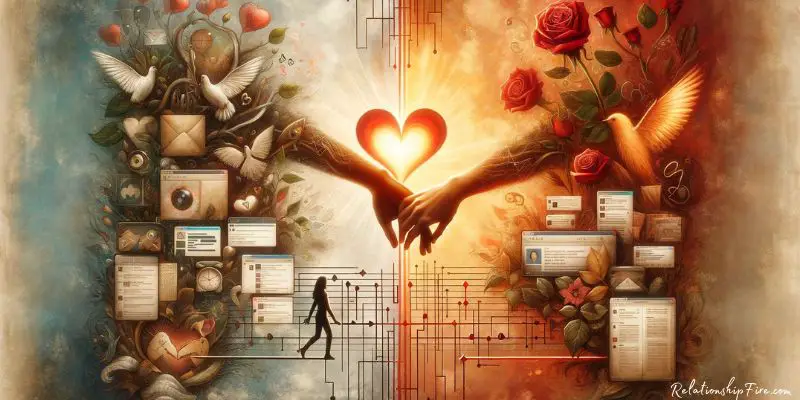Long distance relationships (LDRs) often blur lines. You might be thinking, “Mine feels more like friendship than romance.”
Here is a big-picture summary of the reasons my long distance relationship feels like friendship:
Long distance relationships can feel like friendship due to digital communication taking precedence, shared interests, and limited emotional support akin to friends. This includes comfortable routines, absence of jealousy, and practical future planning, leading to a blend of friendship and love.
Let’s explore these unique reasons, each a revelation in itself.
1. The Digital Pen Pal Paradigm

Long distance relationships often thrive on digital communication, much like a modern version of pen pals.
Texts, emails, and instant messaging dominate our interactions, making it feel more platonic than passionate.
- Constant Texting: We’re always messaging, but it’s more about daily updates than romantic exchanges.
- Email Exchanges: Our emails resemble the ones you’d send to a friend abroad, filled with news and shared experiences.
- Lack of Physical Intimacy: The absence of physical touch shifts the dynamic towards a more friendly territory.
2. The Comfort Zone Conundrum
In your LDR, comfort has replaced excitement. You’ve settled into a routine that feels secure but lacks the spontaneous spark of romance.
- Predictable Calls: Our calls are scheduled and predictable, lacking the unpredictability that fuels passion.
- Routine Topics: We talk about our days, work, and family, but rarely about our feelings or future together.
- Absence of Dates: Traditional dating activities are missing, making our interactions feel more friendly than romantic.
3. The Support System Scenario
Your partner is more of a support system, akin to a close friend.
You’re there for each other, but it’s more about mutual support than romantic love.
- Advice Giving: We often find ourselves giving each other advice on personal and professional matters.
- Emotional Support: We’re each other’s go-to person for venting or sharing worries, much like best friends.
- Lack of Romance: Our conversations lack romantic undertones, focusing more on practical and emotional support.
4. The Shared Interest Syndrome
Perhaps your relationship heavily revolves around shared interests and hobbies, much like a friendship.
It’s more about enjoying activities together than building a romantic connection.
- Gaming Together: We spend hours gaming online, a fun but platonic activity.
- Movie Marathons: Our movie nights feel like those with a friend, complete with casual banter and snacks.
- Hobby Discussions: We often discuss our individual hobbies and interests, but these conversations don’t lead to romantic depth.
5. The Absence of Jealousy
Jealousy, a common element in many romantic relationships, is notably absent in yours.
This lack of jealousy makes your connection feel more friendly than passionate.
- Trust Over Possessiveness: We trust each other completely, with no room for possessiveness or insecurity.
- Individual Social Lives: We both have active social lives and encourage each other to spend time with friends.
- No Fear of Loss: There’s a mutual understanding that our love isn’t threatened by external factors, much like a strong friendship.
6. The Future Planning Paradox
Your future plans are more practical than romantic.
You discuss our goals and ambitions, but these conversations lack the excitement and passion typical of a romantic relationship.
- Career-Focused Plans: We often talk about our career paths and future job opportunities.
- Individual Goals: Our plans mainly focus on individual aspirations rather than shared dreams or a life together.
- Pragmatic Discussions: Discussions about the future are more about practicalities and logistics than romantic aspirations.
7. The Celebration Connection
Celebrating milestones and special occasions feels more like a friendly gesture than a romantic one.
You acknowledge these events, but the emotional depth is akin to that of a friendship.
- Birthday Wishes: Our birthday celebrations are warm and thoughtful, but lack romantic gestures.
- Anniversary Acknowledgments: We acknowledge our anniversaries, but it’s more about marking a milestone than celebrating our love.
- Gift-Giving: Our gifts are thoughtful and personal, but they resemble what you might give a close friend.
8. The Emotional Detachment Dilemma
In your LDR, there’s a noticeable emotional detachment that aligns more with friendship than a romantic relationship.
You care deeply about each other, but the emotional intensity often found in romance is missing.
- Calm Conversations: Our conversations are meaningful yet lack the emotional depth and vulnerability often seen in romantic relationships.
- Rational Responses: We tend to respond to each other’s problems with logic and reason, similar to how a friend would, rather than with deep empathy or passion.
- Independent Emotional Processing: We often process our emotions independently, without relying heavily on each other for emotional sustenance.
9. The Lack of Life Integration
Your lives are parallel but not deeply intertwined.
You have separate friends, hobbies, and routines, resembling a friendship rather than a romantic partnership.
- Separate Social Circles: Our social lives rarely overlap, and we have different groups of friends.
- Independent Hobbies: We pursue hobbies and interests independently, without much involvement from each other.
- Routine Differences: Our daily routines are separate, and we rarely integrate our lives in a way that romantic couples often do.
10. The Comfortable Silence Symptom
In your LDR, comfortable silences are common, but they feel more like the ease you find with a long-time friend rather than a romantic partner.
- No Pressure to Talk: We don’t feel the need to fill every silence with conversation, reflecting a friendship’s ease rather than a lover’s urgency.
- Relaxed Interactions: Our interactions are relaxed and pressure-free, without the intensity often associated with romantic relationships.
- Enjoying Silence Together: We can spend time together online in silence, each doing our own thing, similar to how friends comfortably coexist.
11. The Adventure Absence Anomaly
The thrill and adventure that often characterize romantic relationships are missing in your LDR.
Your interactions are enjoyable but lack the excitement and novelty of a romantic connection.
- Routine Conversations: Our chats are enjoyable but rarely venture into new or exciting territories.
- Lack of Spontaneity: We don’t experience spontaneous adventures or surprise visits that can add a spark to a romantic relationship.
- Predictable Interactions: Our interactions, though pleasant, have become predictable, lacking the zest and unpredictability that fuel romance.
12. The Personal Growth Parallel
Your relationship fosters personal growth, but it mirrors the growth one experiences through a friendship rather than a romance.
- Individual Development: We encourage each other’s personal development, much like supportive friends.
- Separate Journeys: Our growth paths are aligned but separate, reflecting a companionship that respects individuality.
- Learning from Each Other: We learn from each other in ways that enhance our personal lives, akin to the influence of a close friend.
Is it Normal to Feel Like Friends in a Long Term Relationship?
It’s not uncommon to find that, over time, a long distance relationship (LDR) evolves to resemble a close friendship.
This shift is natural and often reflects the deep understanding, comfort, and mutual respect that develop in lasting relationships.
Here’s a look at why this happens:
- Evolving Dynamics: Relationships are dynamic. As they mature, the initial romantic fervor might give way to a more stable, comforting form of love that resembles friendship.
- Shared Experiences: Over time, you accumulate a wealth of shared experiences and inside jokes, akin to what you’d have with a close friend. This builds a strong foundation of camaraderie.
- Changing Needs: As individuals grow and change, so do their needs from a relationship. The need for a confidante or a partner-in-crime might become more pronounced than the need for a traditional romantic partner.
- Distance Factor: Physical distance can make maintaining the traditional elements of romance challenging, leading to a relationship that’s more mentally and emotionally supportive, like a friendship.
Understanding that it’s normal for relationships to evolve can bring a sense of comfort.
It doesn’t necessarily mean a loss of love, but rather a transformation of how that love is expressed and experienced.
Here is a video that I think is helpful when trying to understand why your long-distance relationships might feel more like a friendship:
What to Do When Your LDR Feels More Like a Friendship?
If you’re finding that your LDR feels more like a friendship, here are some practical tips, examples, and scripts to help navigate and possibly rekindle the romantic aspect of your relationship:
1. Open Communication
- Script Example: “I’ve been feeling like our relationship has started to feel more like a friendship lately. I love our connection, but I also miss the romance we used to have. Can we talk about this?”
- Action: Initiate a conversation about your feelings. Be honest but gentle, and listen to your partner’s perspective too.
2. Introduce Romantic Gestures
- Example: Surprise your partner with a love letter or a romantic online date night.
- Action: Small romantic gestures can reignite the spark. Think about what made your relationship feel romantic in the beginning and try to reintroduce those elements.
3. Plan a Visit
- Example: Organize a surprise visit or plan a vacation together.
- Action: Physical presence can reignite the romantic feelings that distance might have dimmed. Use this time to reconnect on a deeper, more intimate level.
4. Set Goals Together
- Example: Discuss plans for the future that include both of you, like a holiday or living in the same city.
- Action: Having common goals can strengthen your bond and give you both something to look forward to as a couple.
5. Create Shared Experiences
- Example: Start a new hobby together online, like a book club or a gaming session.
- Action: Shared experiences can deepen your connection and bring back the feeling of being a couple, not just friends.
6. Increase Emotional Vulnerability
- Script Example: “I want to share something with you that I haven’t told anyone else…”
- Action: Sharing vulnerabilities and fears can bring back the emotional intimacy that’s crucial in a romantic relationship.
7. Seek Professional Advice
- Action: If you’re struggling, consider couples counseling. A professional can offer guidance tailored to your unique relationship.
Remember, it’s okay for relationships to evolve and change. The key is to remain open, communicative, and willing to adapt to ensure both partners feel fulfilled and happy.
Final Thoughts: Reasons My Long Distance Relationship Feels Like Friendship
Embrace the evolution of your long distance relationship.
Whether it feels like friendship or romance, what matters is the connection and mutual happiness. Communicate, innovate, and remember, every relationship is unique. Cherish yours for what it is, and for what it could become.
Read This Next:
